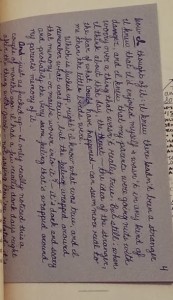On page 100, Eric asks Jen to tell the story “about the day you disappeared.” This request suggests that the relationship between the two has grown more comfortable — to the point where they want to share their most intimate stories. Indeed, Jen affirms the closeness by deciding to tell the story in more detail than she’s ever told before. By telling her story, Jen starts this tradition of sharing that the two continue throughout the rest of the book.
Jen’s story reveals self-knowledge; she realizes this story continues to haunt her and her relationship with her parents. Known by everyone and herself as “Jen-in-danger”, Jen struggles to cope with the fact that her independent personality unintentionally caused a small town crisis. Indeed, Jen explains she only made this discovery “a couple of months ago. I had a few really dark nights.”
The loss of innocence occurs in this story, as Jen realizes “tension in her parents’ marriage” and runs away as a means to cope.
The story also ties into the theme of fact versus fiction. Everyone believed that a stranger had abducted Jen, thus making the fictional man a real part of the story. While the word story implies fiction, the stranger should play no part of what happened. The greatest irony of the story: many elements are truly fiction, because Jen downplayed the scale of her part in it, suggesting she was not comfortable enough with either herself or Eric to tell the full truth.
The letter highlights some methods of expression found only in writing. There are underlines, smudges, and words she crosses out. It resembles a diary entry.



You must be logged in to post a comment.